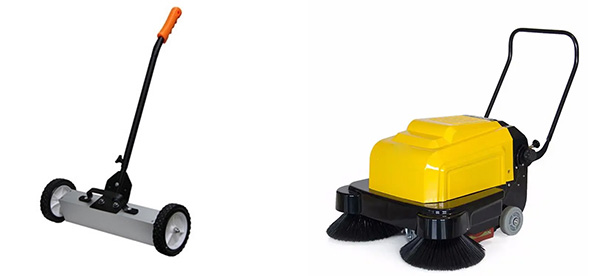Magnetic Sweeper vs. Traditional Sweeper
Sun, Jul 17 by ATO.com
Debris on warehouse or factory floors is inevitable in many industries. Falling metal such as nails, screws and filings must be continuously removed to keep employees safe, protect valuable equipment, reduce downtime due to flat tires, and maintain product standards. Magnetic sweepers are an excellent alternative to conventional sweepers that can remove metal debris in a fraction of the time, greatly reducing manpower.
This allows for more efficient use of employee skills and abilities while maintaining a safe environment. Simple to use and easy to clean, magnetic sweepers are an obvious choice when it comes to keeping your industrial space safe from unsafe debris.

- Safety Standard. Magnetic sweeping, also known as "magnetic brooms", can help keep slip and fall accidents and other workplace related injuries safe. Eliminates the need for manual cleaning while reducing labor hours, resulting in increased uptime and safety levels.
- Product Safety. Equally important as safety is the need to ensure that the quality of the output is never affected by the standards of the production line. Magnetic sweepers collect debris without drawing dust and other contaminants into the air. They are more efficient than manual sweeps and produce cleaner results. This helps ensure that no ferrous material will make its way back into your product.
- Protecting Equipment. Unsecured metal can cause serious damage to machinery and vehicles. Ensuring that all work areas are free of scrap and other unwanted ferrous materials can help increase the life of your equipment. Magnetic sweepers work much more efficiently and effectively than manual sweepers, so you can rest assured that your replacement and repair costs won’t be increased by unnecessary wear and tear.
Magnetic sweepers are useful in many ways. So what are they?
- Aviation. Airfields use magnetic sweepers to remove foreign object debris (FOD) that poses a risk of damaging aircraft or injuring personnel.
- Agriculture. Agricultural workers use 18" magnetic sweeper to protect facilities from metal objects that could injure people, harm livestock, or damage equipment.
- Construction. Construction workers use magnetic sweepers to remove excess metal debris from worksites that could cause injury to employees or damage to equipment.
- Manufacturing. Manufacturing facilities use magnetic sweepers tocollect material waste (eg, blanks, grindings, andshavings) that could injure employees or damage equipment.
- Transportation. Highway and other infrastructure authorities use magnetic sweepers to keep roads clear and keep cars and other vehicles safe.

